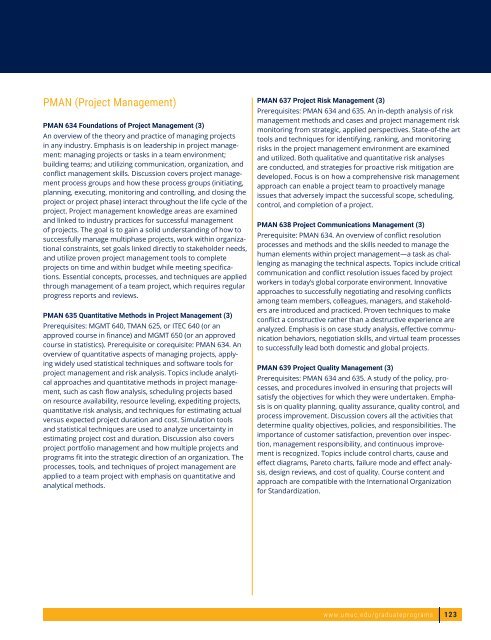2016–2017 2016–2017
2016-2017-graduate-catalog
2016-2017-graduate-catalog
You also want an ePaper? Increase the reach of your titles
YUMPU automatically turns print PDFs into web optimized ePapers that Google loves.
PMAN (Project Management)<br />
PMAN 634 Foundations of Project Management (3)<br />
An overview of the theory and practice of managing projects<br />
in any industry. Emphasis is on leadership in project management:<br />
managing projects or tasks in a team environment;<br />
building teams; and utilizing communication, organization, and<br />
conflict management skills. Discussion covers project management<br />
process groups and how these process groups (initiating,<br />
planning, executing, monitoring and controlling, and closing the<br />
project or project phase) interact throughout the life cycle of the<br />
project. Project management knowledge areas are examined<br />
and linked to industry practices for successful management<br />
of projects. The goal is to gain a solid understanding of how to<br />
successfully manage multiphase projects, work within organizational<br />
constraints, set goals linked directly to stakeholder needs,<br />
and utilize proven project management tools to complete<br />
projects on time and within budget while meeting specifications.<br />
Essential concepts, processes, and techniques are applied<br />
through management of a team project, which requires regular<br />
progress reports and reviews.<br />
PMAN 635 Quantitative Methods in Project Management (3)<br />
Prerequisites: MGMT 640, TMAN 625, or ITEC 640 (or an<br />
approved course in finance) and MGMT 650 (or an approved<br />
course in statistics). Prerequisite or corequisite: PMAN 634. An<br />
overview of quantitative aspects of managing projects, applying<br />
widely used statistical techniques and software tools for<br />
project management and risk analysis. Topics include analytical<br />
approaches and quantitative methods in project management,<br />
such as cash flow analysis, scheduling projects based<br />
on resource availability, resource leveling, expediting projects,<br />
quantitative risk analysis, and techniques for estimating actual<br />
versus expected project duration and cost. Simulation tools<br />
and statistical techniques are used to analyze uncertainty in<br />
estimating project cost and duration. Discussion also covers<br />
project portfolio management and how multiple projects and<br />
programs fit into the strategic direction of an organization. The<br />
processes, tools, and techniques of project management are<br />
applied to a team project with emphasis on quantitative and<br />
analytical methods.<br />
PMAN 637 Project Risk Management (3)<br />
Prerequisites: PMAN 634 and 635. An in-depth analysis of risk<br />
management methods and cases and project management risk<br />
monitoring from strategic, applied perspectives. State-of-the art<br />
tools and techniques for identifying, ranking, and monitoring<br />
risks in the project management environment are examined<br />
and utilized. Both qualitative and quantitative risk analyses<br />
are conducted, and strategies for proactive risk mitigation are<br />
developed. Focus is on how a comprehensive risk management<br />
approach can enable a project team to proactively manage<br />
issues that adversely impact the successful scope, scheduling,<br />
control, and completion of a project.<br />
PMAN 638 Project Communications Management (3)<br />
Prerequisite: PMAN 634. An overview of conflict resolution<br />
processes and methods and the skills needed to manage the<br />
human elements within project management—a task as challenging<br />
as managing the technical aspects. Topics include critical<br />
communication and conflict resolution issues faced by project<br />
workers in today’s global corporate environment. Innovative<br />
approaches to successfully negotiating and resolving conflicts<br />
among team members, colleagues, managers, and stakeholders<br />
are introduced and practiced. Proven techniques to make<br />
conflict a constructive rather than a destructive experience are<br />
analyzed. Emphasis is on case study analysis, effective communication<br />
behaviors, negotiation skills, and virtual team processes<br />
to successfully lead both domestic and global projects.<br />
PMAN 639 Project Quality Management (3)<br />
Prerequisites: PMAN 634 and 635. A study of the policy, processes,<br />
and procedures involved in ensuring that projects will<br />
satisfy the objectives for which they were undertaken. Emphasis<br />
is on quality planning, quality assurance, quality control, and<br />
process improvement. Discussion covers all the activities that<br />
determine quality objectives, policies, and responsibilities. The<br />
importance of customer satisfaction, prevention over inspection,<br />
management responsibility, and continuous improvement<br />
is recognized. Topics include control charts, cause and<br />
effect diagrams, Pareto charts, failure mode and effect analysis,<br />
design reviews, and cost of quality. Course content and<br />
approach are compatible with the International Organization<br />
for Standardization.<br />
www.umuc.edu/graduateprograms 123


